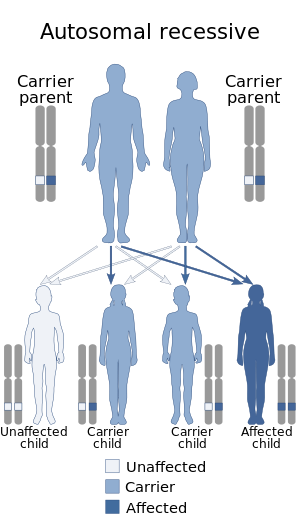H syndrome
This article relies too much on references to primary sources. (December 2018) |
| H syndrome | |
|---|---|
| Other names | Histiocytosis-lymphadenopathy plus syndrome |
 | |
| This condition is inherited in an autosomal recessive manner | |
H syndrome, also known as Histiocytosis-lymphadenopathy plus syndrome or PHID,[1] is a rare genetic condition caused by mutations in the gene which encode the human equilibrative nucleoside transporter (hENT3) protein.[2]
It is also known as Faisalabad histocytosis, familial Rosai-Dorfman disease, sinus histocytosis with massive lymphadenopathy and pigmented hypertrichosis with insulin-dependent diabetes mellitus syndrome.
Presentation[]
This syndrome has a number of different clinical features many of which start with the letter 'H' giving rise to the name of the syndrome. These features include[citation needed]
- Hyperpigmentation
- Hypertrichosis
- Hepatosplenomegaly
- Hearing loss
- Heart anomalies
- Hypogonadism
- Low height (short stature)
- Hyperglycemia/diabetes mellitus
- Hallux valgus/flexion contractures
Exophthalmos, malabsorption and renal anomalies have also been reported.[citation needed]
Genetics[]
The SLC29A3 gene is located on the long arm of chromosome 10 (10q22).[citation needed]The causative gene was identified in 2010.[3]
Pathogenesis[]
This is not understood at present.[citation needed]
Management[]
There is no curative treatment for this condition at present. Management is directed to the clinical features.[citation needed]
History[]
This condition was first described in 1998.[4]
References[]
- ^ Virginia P. Sybert (2017). Genetic Skin Disorders. Oxford University Press. pp. 182–. ISBN 978-0-19-027648-5.
- ^ Moynihan L M, Bundey SE, Heath D, Jones EL, McHale DP, Mueller RF, Markham, AF, Lench NJ (1998) Autozygosity mapping, to chromosome 11q25, of a rare autosomal recessive syndrome causing histiocytosis, joint contractures, and sensorineural deafness. Am J Hum Genet 62: 1123-1128
- ^ Morgan NV, Morris MR, Cangul H, Gleeson D, Straatman-Iwanowska A, Davies N, Keenan S, Pasha S, Rahman F, Gentle D, Vreeswijk MPG, Devilee P, and 10 others. Mutations in SLC29A3, encoding an equilibrative nucleoside transporter ENT3, cause a familial histiocytosis syndrome (Faisalabad histiocytosis) and familial Rosai-Dorfman disease. PLoS Genet. 6: e1000833
- ^ Moynihan L M, Bundey SE, Heath D, Jones EL, McHale DP, Mueller RF, Markham, AF, Lench NJ (1998) Autozygosity mapping, to chromosome 11q25, of a rare autosomal recessive syndrome causing histiocytosis, joint contractures, and sensorineural deafness. Am J Hum Genet 62: 1123-1128
External links[]
- Autosomal recessive disorders
- Genetic diseases and disorders
- Rare syndromes